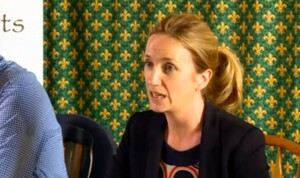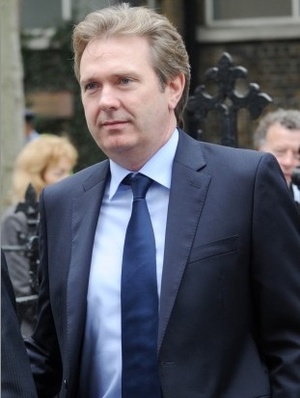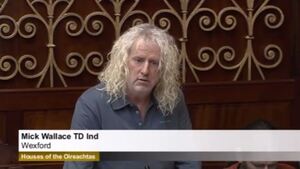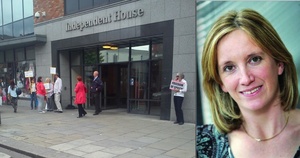This may interest you.
Gemma O’Doherty was among several speakers at Airing Erris in An tSeanscoil in Ceathrú Thaidhg, Co. Mayo on Sunday organised by Afri Ireland [Action From Ireland].
Other speakers included former Garda John Wilson; former UN Assistant Secretary General Denis Halliday; former Garda Sergeant Bernard McCabe; peace campaigner Margaretta D’Arcy and farmer/environmental activist, Willie Corduff.
Ms O’Doherty, a former journalist at the Irish Independent, spoke about her involvement in the Fr Niall Molloy murder case; how an alleged witness tried to run her off the road when she went to question him; the penalty points controversy and her concerns relating to Irish media.
“To my shame, as a journalist, I have never been or reported on the appalling issues you, as a community, have been subjected to here, until a few weeks ago when I came over to meet Ed Vulliamy from The Observer. My visit happened to coincide with the transport of the tunnel boring equipment, leaving Glengad and heading, I think, to the refinery potentially, as it was making its way to Dublin, to leave the country.
And it was only the sheer coincidence of my being here with Ed that gave me a glimpse of what you, as a community, has suffered in terms of the level of heavy policing. As the machinery was moved through the night, in the cover of darkness, both Ed and I witnessed at least two van loads of Gardai, on a Sunday night, into the early hours of Monday morning, not a protester in sight, apart from one individual who’s a local resident, myself, another journalist and two local residents.
And, for some reason, at least a dozen gardai were required for this exercise. The one thing that struck me as a Dubliner, living in a city which is so disgracefully, badly policed and on a Sunday night, when the city and other cities, are bereft of gardai, it was an absolute scandal to see so many of them here, for absolutely no reason whatsoever. I wrote up that story and it was not used. But I did report what had happened that evening to Clare Daly and she raised it at Leader’s Questions and directly challenged Enda Kenny on it.
But the scenario seems to be that ‘you ignore it and it will go away’. Now both Ed and myself do not intend to allow that incident to go away. We were shocked at how the three people, the three local residents, were treated by the gardai that night. They didn’t speak to anyone, they acted as if we were subhuman, I don’t think they were aware that there were two journalists present but it did give me an insight into what has been happening here, which the public have not been fully informed about.
And I think now the public are much clearer about what has been happening within the gardai, thanks to the brilliant work of John Wilson, who is here today. John is a hero and a patriot of the highest order and his colleague Maurice McCabe. And I think we do hope that more whistleblowers will come forward.
When [Former Garda Commissioner] Martin Callinan came before the Public Accounts Committee in January of this year, he said he found it extraordinary that, in his force of 12,000, that there were just two individuals making allegations of this nature, not hundreds, not dozens, just two. And, of course, there’s nothing extraordinary about that at all.We’ve seen how John and Maurice have been treated. And so many officers who might be inclined to come forward would obviously be terrified at the prospect.
A close contact of mine, a senior garda who has left the force now, he tells me stories of shocking malpractice and corruption when we talk on a regular basis. And I said to him recently, ‘why won’t you go public?’ And he said to me, ‘Gemma, they will destroy me’. And I said, ‘they will only destroy you, if there is something they can destroy you with’.
And he said to me, ‘No, they don’t need anything’ and the implication being that things could be made up. As I’ve said we’ve seen the devastation caused to Maurice and John Wilson’s lives, to their wives and to their families.
At every step, in their battle to expose corruption, they were blocked, they were harassed, they were intimidated, they were victimised and both of them have paid such a huge price and I don’t think the public really understand the ongoing ordeal that both of those men are suffering.
And it certainly is the case it is a very dangerous time in this country to be a whistleblower – especially if you are holding the gardai to account. At a garda reform conference recently in Farmleigh, in the Phoenix Park, Nuala O’Loan, the former Police Ombudsman in Northern Ireland, described the blue wall of silence that acts as a cover-up for wrongdoing in the gardai. And, certainly, we’re seeing that in so many different cases around the country at the moment.
Until my dismissal last summer, I spent almost two decades working as a journalist with the Irish Independent but, for me, it was during the summer of 2010 that my career took a turn, that would have a huge impact on my life and would change my views of the Garda Siochana and this State. And it all began with a chance encounter with a man from County Offaly while I was doing a story on the Dublin Horse Show.
He was a citizen whistleblower who was aware of a murder in Co. Offaly in 1985 which he believed had been covered up. And it was the murder of a priest, Fr Niall Molloy. I won’t go into too much detail on it but I wasn’t really aware of it at all. Basically, I spoke to that man that day and he asked me would I go down and visit his hometown of Clara and talk to him about serious concerns that he had about this case.
Now, Niall Molloy was a Roscommon priest from a beautiful part of Roscommon, Castlecoote – a very popular priest, he’s still remembered there today. And he was a close friend of a very well connected couple, Theresa and Richard Flynn. He was beaten to death in their country mansion, after a lavish wedding, attended by senior politicians and other members of high society at the time.
It was a savage beating, he was left to die for up to six hours. That has been proven by three independent neuropathologists and the whole thing was basically brushed under the carpet. The Catholic Church had its reasons for doing so, they were led to believe that things had been happening in the house that hadn’t been.
And this citizen whistleblower, who was a neighbour of the family, had built up a bank of knowledge through the years. He had been at the wedding and he had seen many things that he shouldn’t have seen. And he had never been interviewed by the guards. So this led me on a long journey, up and down the country, talking to so many people who had been there that weekend, who had witnessed events in the run-up to the murder. And many of them wanted truth and justice. But they had never been spoken to by the gardai.
And then I started to talk to other people whom I believed had questions to answer and, invariably, at the mere mention of Fr Niall Molloy, the phone would either go dead or I would be marched off a premises and I felt that there were a lot of people out there that had questions to answer, who were very, very uncomfortable talking about this particular murder.”
One man who is believed to have witnessed the murder and said that the gardai had put words in his mouth, when he was making his statement, attempted to run me off the road when I went to question him. So, as I said, it was quite clear that there were many people who had never been interviewed by the guards and clearly had something to hide or something to fear. So, a couple of months later, towards the end of 2010, I published my first expose on that, under my previous editor, Gerry O’Regan,and much of what I uncovered, we couldn’t put into the public domain at that time.
Many of the cast of characters in this particular case include the priest himself – he was a very wealthy man through inheritance. He was, by today’s standards, a millionaire. But he didn’t have any interest in a lifestyle, he had a love of horses and that’s unfortunately partly what led him to his death. You had his friends who were a society family, whose fortunes were on the wane, we had their close family friends Fianna Fail politicians, one of whom was a household name. We had a judge, who handled the case, who was a senior member, a member of Fine Gael and ran for the party, and his handling of the case was a gross corruption of the course of justice.
We also had the country’s most notorious criminal, Martin Cahill involved in this case. He broke into the offices of the DPP in 1987 and stole the Garda file, among others, into this case. The gardai then subsequently did a deal with him and another notorious criminal, John Traynor to get that file back because the State was so embarrassed by its contents.
And a deal was done with these two men and the file was given back and John Traynor, in particular, had charges dropped against him. And then my murdered colleague, Veronica Guerin – who was very close to exposing the truth about this case at the time of her murder – and I’ve spoken to many people who said that she really, really desperately wanted to get the truth, for the public to know the truth about what happened. Sadly, she never got the chance to do that.”
So, around this time, I made a statement to, I decided that I had to make a statement to the gardai and, at the time, I was not aware of the problems within the force and I don’t think many people were – apart from those who were living it, such as people down here. And I made a lengthy statement and I handed over the names of many people who wanted truth and had no problem speaking to the gardai and also to those who had questions to answer.
At the time, I also went to see a number of TDs, including Alan Shatter, who was preparing to go to into Government, it was the end of 2010. I told him about the case, I felt that he had an understanding of it and I described it as a ‘dreadful miscarriage of justice’ and he said, ‘Gemma, justice wasn’t carried at all’ and he vowed that, under a Fine Gael government, this case would be dealt with.
But we’re now in the midway point of 2014 and we certainly haven’t had a satisfactory end to it. And it’s a case that could be solved in a week. It’s just that there are still so many people in Ireland who desperately want the truth about this case concealed.
So, around that time anyway the case was reopened under the former commissioner, Fachtna Murphy and I left the guards to get on with it and continued my work on other cases. And I then discovered really that what was happening was not a proper investigation at all. I got some calls from the Midlands, from people saying that the guards had been to see them, they [the gardai] didn’t seem particularly interested in the murder.They [the gardai] raised my name, they were asking questions about me and what I had been told by these people and I asked the gardai that they would stop bringing my name up at interviews, that it was nothing to do with me and that I was just a reporter. I was very, very concerned about this practice and it led me to believe that I was the person who was being investigated.”
During this time other families started contacting me and they too had suffered the blue wall of silence. They were, many of them, were mothers who had lost children. Their children, they believed, had been victims of homicide and that the cases had not been investigated properly by the gardai. And these people were broken and they were broken, not having lost, because they lost a loved-one and a child but because the State had turned its back on them, in the form of the gardai.
And they felt they were going to the media but that they were getting absolutely nowhere. And I could not understand, in many cases, some of the cases were shocking to the core and involved not only the gardai but State solicitors and other members of the legal profession but they were not getting anywhere.
So I started investigating those questions and asking the gardai about them. And, around that time, towards the end of 2012, I was then approached by somebody who was familiar with Maurice McCabe’s evidence. And I was asked to have a look at that. And I found it utterly damning and compelling. It showed me that the abuse of our road safety laws was widescale. And, as a journalist looking at the raw data, and the names of those, so-called clusters, as John Wilson and Maurice McCabe describe them, the people who were time and time again getting penalty points quashed or summonses unserved, these were not the ordinary Irish people at all.
You put their names into Google and they invariably came up as being a senior person in GAA or the HSE, journalists, solicitors, judges, and senior gardai, and gardai. But it was so obvious, it was so obvious this was a widespread problem and it was an elite that were availing of this and for me, from the moment I looked at it, I could see that it was a constitutional issue because the law was not being applied fairly. And those of us who take our penalty points and pay higher insurance premiums, etc. were having to carry the burden of this while there was an elite group in society who were basically going on to the roads in our country and doing whatever speed they liked. And, of course, Maurice McCabe has exposed an awful lot, much more serious cases as well.”
There’s been an impression given, in the last few months that we’ve seen a sea change in justice and I think John [Wilson] and I would agree with me in this that we certainly didn’t think that we would see the removal of a Commissioner and a Minister for Justice in the last two months and that is a very, very positive step but there’s still an awful lot of people who surrounded the senior echelons of Phoenix Park and Stephen’s Green, the department of justice, that were part of the old regime and they have serious questions to answer too and they’re still in their jobs.
And they were fully supportive of the efforts of Martin Callinan and Alan Shatter and their desperate attempts to silence the whistleblowers. So, even as we speak, I mean it’s hard to imagine this, but there are dark forces still trying to undermine the courageous work of John Wilson and Maurice McCabe. And if I think the public were aware of that, they would be truly shocked at what is still happening.”
The main purpose of journalism and good journalism is to hold power to account. Public enlightenment is the forerunner of justice and the foundation stone of democracy but unfortunately there are still those in the Irish media who languish under the delusion that their job is to protect the Government and to protect the gardai and to keep the dirty secrets, their dirty secrets away from the little people.
And the whistleblower scandal has shone such a damning light on some of the country’s crime correspondents in particular who are so reliant on the police for stories that they dare not turn around and bite the hands that feed them and they betray the public in doing so because the public are not being told anything close to the truth. And, instead, what they’ve shamelessly tried to do is to blacken the whistleblowers and pretend that the whole controversy was a storm in a teacup or a “ball of smoke” as one journalist put it so cynically.
The legendary editor Joseph Pulitzer once said that journalism is a profession of unequaled importance, for its influence on the minds of and morals of its people. And he also said that a cynical press would, in time, produce a people as base as itself. And, sadly, the public are so used to being fed propaganda by some elements of the Press and the broadcast media that they run the risk of not seeing it for what it is and believing the bluff. And I think the disgraceful coverage of the GSOC bugging controversy is a clear example of that.
I think, as a journalist, I see younger journalists coming up through the ranks and you worry that the qualities that are required to be a journalist that were once demanded by editors: qualities like doggedness, tenacity, fearlessness, and rat-like cunning, these qualities today, you feel are being gradually replaced by a much tamer breed of journalists who are sort of afraid to rock the boat, or rake the muck, for fear of upsetting the cosy relationships that exist between power and the media in this country.
And some of them have forgotten the things that should be the driving force behind great, public interest journalism. And that is to comfort the afflicted and afflict the comfortable and to write the news and to create hell. Some of our media just can’t bear to leave the cosy clubs in Leinster House, or the Phoenix Park and become an outsider. But that is what decent journalism is all about – being an outsider.
And these old-fashioned values of good reporting, such as being a digger and a snoop and holding power to account today are almost seen as being liabilities by some news outlets who prefer to sort of go for a softer brand of nice news. And in many ways, today’s reporters are expected to play the role of diplomat and to toe the party line.
But in maintaining this delicate balance and having to watch their backs, the public and democracy are the ones that suffer and, as a result of that, newspapers will remain in terminal decline. And we’ve seen in Britain recently how this cosy relationship between the police and the press and politicians is so harmful to the public interest and to people who’ve been very, very badly hurt by the police and by the press.
So, I’ll just summarise by saying, as far as the changes we have seen recently in the gardai. They do, so far, remain cosmetic. I mean decent officers say to me that they feel that two thirds of the force are not doing their job and one third is holding them up. And that is very, very serious. I think we’re way beyond the concept that this is just a few rotten apples. I think at this stage the barrel needs a good clear-out.
The corrupt detectives who’ve destroyed many, many lives are still on their – even though some of them have left, not all of them – they’re still on their huge pensions or are on the beat and, almost four months on, the public still have not been told why Martin Callinan left office.
This is an unbelievable situation in a democracy, that the public are being kept in the dark about the sudden demise of the head of their police force. We have a British citizen living at the other end of the country, down in Cork, who is a prisoner on this island, who the State, the gardai, have spent an estimated €50million investigating the murder of Sophie Toscan du Plantier. I’m talking about Ian Bailey. And there is not one shred of evidence against that man and he cannot leave this State.
The public also haven’t been told about the full truth about what happened here in Erris. And, you know, thanks to the outstanding work of Lorna Siggins, one of the very few journalists who has tried to highlight the suffering in this community. And, also, I want to mention the brilliant work of Richie O Domhnaill whose award-winning film, The Pipe (2010), I think should be compulsory viewing for every schoolchild in Ireland. It’s an outstanding piece of work.
“So I’m going to finish up now with the words of a man who has shone such a bright light on corruption in the gardai, Sergeant Maurice McCabe and to whom we owe so much. And who is still suffering in his attempts to go about his business as a sergeant in Mullingar. He said: ‘We are a very corrupt police force, from the top down. We just reported corruption and we were attacked from all sides. Nothing happens to any of those yet we get gagged, harassed, sanctioned, blacklisted, disciplined, threatened and isolated. No one cares and no one wants to know. It’s very hard to take.’
Now that was said quite a few months ago. At least now Maurice McCabe and John Wilson are being listened to but we can only wait to see what the legacy of their courage and integrity will be and whether it will finally benefit the public in terms of trying to get this police force to do its job properly and start treating those of you here who’ve been treated with such disrespect and to see a change coming because it is so badly, badly needed. Thank you.
Previously: Eyewitness Silenced






